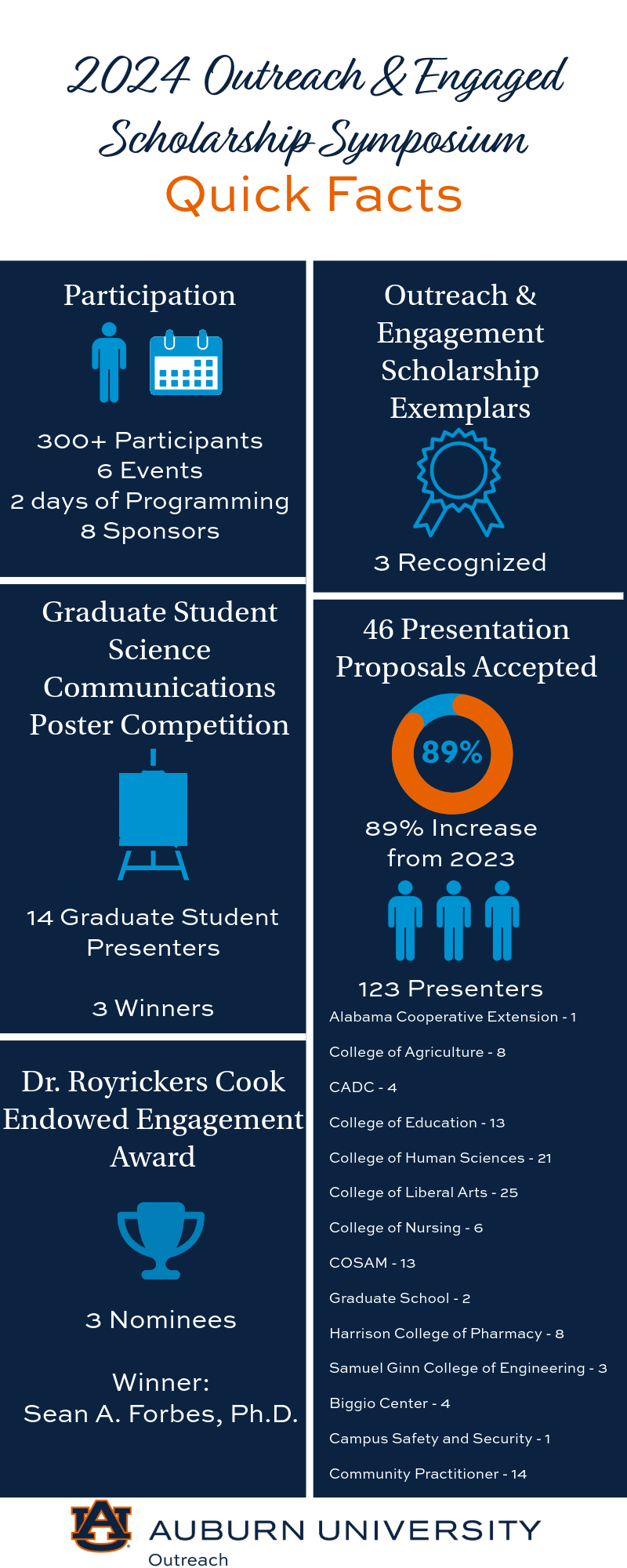Outreach and Engaged Scholarship Symposium
Save the Date for the 2025 Symposium!
Thank you for your interest in the 2025 Outreach and Engaged Scholarship Symposium. The theme for this year's symposium is "Catalytic Engagement through Strategic Access, Opportunity & Collaboration."
The symposium is to be held on Wednesday, August 27 and Thursday, August 28. The anticipated location is the Auburn University Hotel and Dixon Conference Center.
Participant registration will open on May 1, 2025. Please bookmark this page to learn more as information becomes available.
Call for Proposals
Thank you for your interest in submitting a proposal for the 2025 Outreach and Engaged Scholarship Symposium. The theme for this year's symposium is "Catalytic Engagement through Strategic Access, Opportunity & Collaboration."
The Call for Proposals will be available from Monday, January 13 through Friday, June 6, 2025. Finalized information for accepted proposals will be shared in the weeks following the deadline for proposals.
The symposium is to be held on Wednesday, August 27 and Thursday, August 28. The anticipated location is the Auburn University Hotel and Dixon Conference Center.
If you are a graduate student submitting a proposal for the Graduate Student Outreach and Engaged Scholarship Poster Session on Wednesday, August 27, you will be required to provide your faculty advisor's name, email address, college, and department.
It is recommended that this survey be completed on a desktop browser.
Please ensure you have all proposal and presenter information before beginning the survey in the event of a timeout. If you need to revisit and continue the survey later, you may do so as long as you are using the same device and browser.

The 2024 Symposium:
- Emphasized the importance of mutually beneficial relationships and showcase successful partnerships that empower both academia and the community, fostering successful solutions and growth.
- Encouraged interdisciplinary collaboration and boundary spanning initiatives and explore how engaged scholarship transcends traditional academic silos, connecting diverse fields and perspectives.
- Encouraged sharing of best practices throughout the lifespan (from inception to completion) of outreach and engagement partnerships.
- Encouraged student STEM/STEAM communication, engagement and outreach.
Symposium Quick Facts:
Participation
- 300+ Participants
- 6 Events
- 2 days of Programming
- 8 Sponsors
Graduate Student Science Communications Poster Competition:
- 14 Graduate Student Presenters
- 3 Winners
Dr. Royrickers Cook Endowed Engagement Award
- 3 Nominees
- Winner-Sean A. Forbes, Ph.D.
Outreach and Engagement Scholarship Exemplars
- 3 Recognized
46 Presentation Proposals Accepted
- 89% Increase from 2023
-
123 Presenters
- Alabama Cooperative Extension-1
- College of Agriculture-8
- CADC-4
- College of Education-12
- College of Human Sciences-21
- College of Liberal Arts-25
- College of Nursing-6
- COSAM-13
- Graduate School-2
- Harrison College of Pharmacy-8
- Samuel Ginn College of Engineering-3
- Biggio Center-4
- Campus Safety and Security-1
- Community Practitioner-14

Presenter Hub
Welcome to this year’s Outreach and Engaged Scholarship Symposium Presenter Information Hub. Please revisit this hub for symposium presenter information and updates. University Outreach appreciates your participation as a symposium presenter this year!
In keeping with its theme “Empowering Partnerships to Advance Beyond Boundaries,” the 2024 Symposium will:
- Emphasize the importance of mutually beneficial relationships and showcase successful partnerships that empower both academia and the community, fostering successful solutions and growth.
- Encourage interdisciplinary collaboration and boundary-spanning initiatives and explore how engaged scholarship transcends traditional academic silos, connecting diverse fields and perspectives.
- Encourage sharing of best practices throughout the lifespan (from inception to completion) of outreach and engagement partnerships.
- Encourage student STEM/STEAM communication, engagement, and outreach.
The symposium will also promote, recognize, support, and appreciate established and emerging engaged scholars, including community partners, students, staff, and faculty addressing critical needs in their work. The symposium allows attendees to gain perspectives on the impact of outreach and community-engaged scholarship. Furthermore, this is an opportunity to pause to examine what’s on the horizon for the future.
Dates to Remember:
- July 15, 2024 – All acceptances and edits to your presentation synopsis are due to the Office of Faculty Engagement.
- July 28, 2024 – Registration closes.
- August 23, 2024 – Deadline for Non-Auburn University Participants to request parking pass information.
Location & Parking:
- The 2024 symposium will take place at the Auburn University Hotel and Dixon Conference Center, located at 241 South College Street, Auburn, AL. 36830.
- We ask that Auburn University faculty and staff use Auburn University parking for the symposium. There are A and B zone decks and lots very close to the Auburn Hotel and Conference Center. Tiger Transit also lets off at several stops near the Auburn University Hotel and Dixon Conference Center. For presenters who do not have an Auburn University parking pass, please contact OFEEOA@auburn.edu or 334-844-5706 no later than Friday, August 23, 2024 for parking guidance.
Presenter General Information
We extend our appreciation to our campus partners for their generous sponsorship of the Outreach & Engaged Scholarship Symposium this year!
Presenting Sponsor
Graduate School
Platinum Sponsors
Samuel Ginn College of Engineering
Harrison College of Pharmacy
Silver Sponsor
College of Forestry, Wildlife and Environment
Bronze Sponsors
Harbert College of Business
College of Human Sciences
College of Sciences & Mathematics
College of Veterinary Medicine
Symposium Program
Complete Schedule Now Available!
Check out the complete schedule of the symposium this year: luncheon and keynote panel, poster and plenary sessions with presentations from more than 120 scholars and professionals from colleges and units across the university as well as community and other higher education organizations, a University Outreach Resource Fair and Poster Session, and the AAA Experience Reflection Reception. This year’s symposium is an opportunity for intentional conversations about how engaged scholarship can lead to significant, positive impacts in the community and the academy. We look forward to seeing you there!
Last Updated: April 28, 2025
